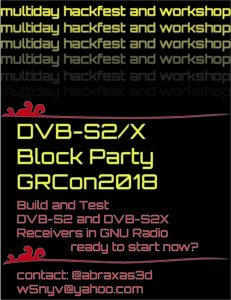Hello everyone,
GNU Radio Conference is coming up in September. If you haven’t registered and want to go, please do at https://www.gnuradio.org/grcon-2018/
There’s a special event this year called Block Party.
It’s an effort to get DVB-S2 and DVB-S2X receivers in GNU Radio.
We will have our own room and tables and swag. We will have docents enthusiasm and test equipment. We’re looking for more! We’ll have documentation and refreshments.
We need blocks!
Most blocks needed for DVB-S2/X receive do, in some form, already exist. Some do not. Some just need additional modulation and codings added to them.
Receiver design is hard, but breaking it up into small blocks makes it tractable.
The DVB protocol documents are all open. There are implementation guidelines. See https://www.dvb.org/
There are several community members that are experts in this area. There is a team (Phase 4 Ground – find out more at https://phase4ground.github.io/) that needs DVB-S2/X to work in GNU Radio. There is a lot of interest from a variety of other groups including Libre Space, ARRL, AMSAT, and TAPR.
If you are able to contribute to this effort, I want to know about it! I am here to support it. I’d like nothing better than to complete the Block Party at GNU Radio Conference with working, tested, documented blocks for a DVB-S2/X receiver. This contribution makes our open source terrestrial and space radio designs for Phase 4 Ground possible, and also opens up a lot of other work.
The thing that is considered the hardest part is the LDPC FEC decode. We have an open source implementation that targets GPUs. We want to take this and get it into RFNoC. If you are working on this as well, we want to collaborate and support and combine and promote.
The GPU implementation (by Charles Brain G4GUO) of LDPC decode can be found at our repository folder here: https://github.com/phase4ground/DVB-receiver/tree/master/G4GUO-LDPC-on-GPU/DVB-S2XTxRx
Phase 4 Ground is devoted to an open source implementation of DVB-S2 and DVB-S2X for amateur radio terrestrial and space use. We are part of Open Research Institute. Learn more about this non-profit here: https://openresearch.institute/
